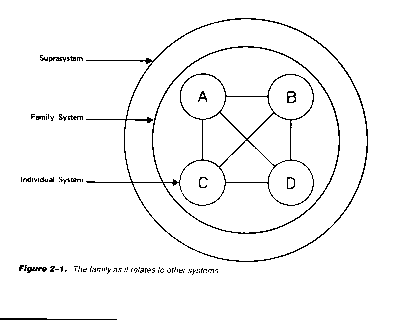Defining the term "Family"
"FAMILY" is defined as one or more individuals closely related by
blood, marriage, or friendship.
This definition is obviously broad: It would include
cohabiting
people of either sex, single parents and their children, and
blended (step) families, as well as the stereotypical nuclear
family.
In addition, this definition is bound neither by residence
(household) nor by age cohort (generation). Thus, "family" can
refer to one's extended family of origin as well as to one's
close friends. By using this broad definition of family, the
family system becomes a dynamic, interrelated concept, not
restricted by artificial legal or residential boundaries.
Bomar, PJ. (Ed.) (1996). Nurses and Family Health Promotion:
Concepts, assessment, and interventions (2nd ed.) (p. 17).
Philadelphia: WB Saunders Company.
A FAMILY is a group of people linked together by some combination
of
love, commitment, cohabitation, children, bloodlines, memories
and
thoughts about the future. It's a matter of connection -- with
each
other, with a shared past and future, and with generations before
and
since. And it's a matter of responsibility. When you're in a
family,
you don't need to see each other every day, or even every week,
but
you need to know, unconditionally, that if necessary, those
people
will be available to you.
Veciana-Suarez, Ana. (1996, August 20). Dr. Ruth turns eye
toward families.
Morning Star, p. D1.
STAGES OF FAMILY DEVELOPMENT AND TASKS
| STAGE | CRITICAL TASKS |
| Beginning |
- Separating from family of origin
- Managing a household
- Deciding to have children
|
| Infant |
- Managing time, energy
- Developing parenting skills
|
| Preschool |
- Making employment decisions
- Deciding to have more children
|
| School Age |
- Developing parental identity
|
| Adolescent |
- Evolving independence of child(ren)
- Facing economic issues
|
| Launching |
- Disengaging
- Reestablishing marital bond
|
| Posparental |
- Deciding on and dealing with retirement
|
| Aging |
- Dealing with loss of function, dependency
|
Okun, B. (1984). Working with Adults: Individuals, Family,
and
Career Development. Monterey, CA: Brooks/Cole; and
Carter, E. & McGoldrick, M. (1988). The Family Life Cycle: A
Framework for Family Therapy (2nd ed.). New York: Gardner
Press.
 Systems
Systems
 Family Realms
Family Realms
FAMILY REALMS
| REALM | REALM FUNCTIONS |
| Development |
- family
- individual
- career
- marital
- parental
|
| Interaction |
- relationships
- communication
- nurturance
- intimacy
- social support
|
| Coping |
- managing resources
- problem solving
- adapting to stressors and crises
|
| Integrity |
- shared meaning
- family history
- boundary maintenance
- family identity & commitment
- family values
- family rituals
- family spirituality
|
| Health |
- family health beliefs
- health status of members
- health responses and practices
- lifestyle
- health care in illness and wellness
|
Anderson, KK, Tomlinson, PS. (1992). The family health system:
An emerging paradigmatic view for nursing. Image 24,(1),
57-63).
Family Health Nursing:
assessment and enhancement of family
health status, family health assets, and family potentials.
 Circumplex Model
Circumplex Model
 Systems
Systems
 Family Realms
Family Realms
 Circumplex Model
Circumplex Model